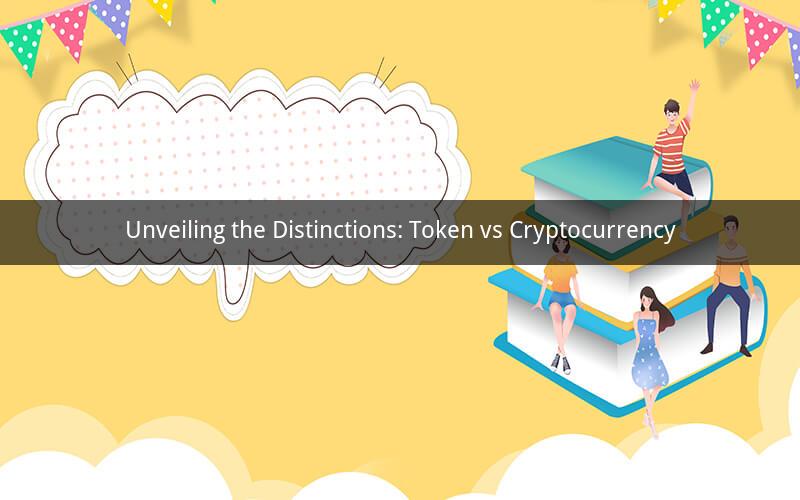
In the vast world of digital assets, two terms often come up frequently: token and cryptocurrency. While they are closely related, they have distinct characteristics and purposes. This article aims to explore the differences between token and cryptocurrency, shedding light on their unique attributes and functionalities.
1. Definition and Origin
Cryptocurrency is a digital or virtual form of currency that uses cryptography for security. It operates independently of a central authority, such as a government or financial institution. Bitcoin, the first cryptocurrency, was introduced in 2009, and since then, numerous cryptocurrencies have emerged.
On the other hand, a token is a digital asset that is built on top of a blockchain platform. It represents a unit of value or a utility within a specific ecosystem. Tokens can be created for various purposes, such as funding a project, accessing a service, or rewarding users.
2. Purpose and Functionality
Cryptocurrencies are primarily used as a medium of exchange, similar to traditional fiat currencies. They enable users to buy goods and services, send money, and participate in decentralized financial systems. Cryptocurrencies like Bitcoin and Ethereum have gained widespread recognition as digital currencies.
Tokens, on the other hand, serve a broader range of purposes. They can represent ownership, access rights, or utility within a specific ecosystem. For example, a token may grant users access to a decentralized application (DApp), incentivize participation in a network, or represent a share of a company's equity.
3. Blockchain Platform
Cryptocurrencies are built on their own blockchain networks, such as Bitcoin's blockchain. Each cryptocurrency operates independently and has its own set of rules and protocols.
Tokens, however, are often built on existing blockchain platforms, such as Ethereum, Binance Smart Chain, or Tron. These platforms provide the necessary infrastructure for token creation, smart contract functionality, and decentralized applications.
4. Supply and Distribution
Cryptocurrencies have a predetermined supply, which is often fixed. For example, Bitcoin has a maximum supply of 21 million coins. This scarcity is intended to create a deflationary effect and maintain the value of the currency over time.
Tokens, on the other hand, can have varying supply and distribution models. Some tokens may have a fixed supply, similar to cryptocurrencies, while others may have a variable supply, allowing for continuous issuance or burning of tokens.
5. Market Value and Volatility
Cryptocurrencies tend to have higher market volatility compared to traditional fiat currencies. This is due to their speculative nature and the limited number of participants in the market. Cryptocurrencies like Bitcoin and Ethereum often experience significant price fluctuations over short periods.
Tokens, depending on their purpose and market demand, can also be subject to volatility. However, the level of volatility may vary depending on the specific token and its underlying ecosystem.
6. Regulation and Legal Status
Cryptocurrencies are subject to varying degrees of regulation across different countries. Some governments have embraced cryptocurrencies, while others have imposed strict regulations or even banned them.
Tokens, being built on blockchain platforms, may also be subject to regulation, depending on their nature and usage. In some cases, tokens may be classified as securities, requiring compliance with securities laws and regulations.
Frequently Asked Questions:
1. What is the main difference between a token and a cryptocurrency?
A token is a digital asset built on a blockchain platform, serving various purposes within an ecosystem. Cryptocurrency, on the other hand, is a digital or virtual form of currency used as a medium of exchange.
2. Can a token be used as a cryptocurrency?
No, a token and a cryptocurrency are distinct entities. While a token can represent value or utility, it is not necessarily a cryptocurrency itself.
3. Are all tokens built on the Ethereum blockchain?
No, tokens can be built on various blockchain platforms, including Ethereum, Binance Smart Chain, Tron, and others.
4. Can a token be used to purchase goods and services?
Yes, some tokens are designed to serve as a medium of exchange, allowing users to purchase goods and services within a specific ecosystem.
5. Are tokens subject to the same regulations as cryptocurrencies?
The regulatory status of tokens can vary depending on their nature and usage. While some tokens may be subject to the same regulations as cryptocurrencies, others may be subject to different regulations or even be classified as securities.